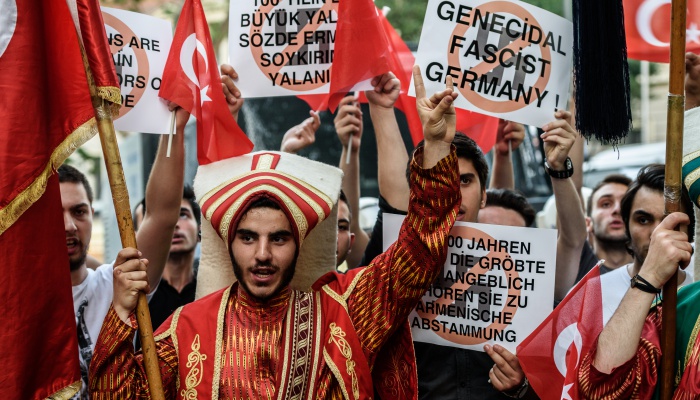The German government is facing an intensified public campaign in favor of banning Turkish nationalist group the “Grey Wolves,” or Ülkü Ocakları in Turkish. Stefan Müller, the parliamentary group leader of the Christian Social Union (CSU in Bavaria) has described the movement as “Erdoğanist nationalism.”
In 2015 the nationalists in Turkey joined forces with President Recep Tayyip Erdoğan, with their party, the Nationalist Movement Party (MHP), forming an alliance with Erdoğan’s ruling Justice and Development Party (AKP). Serious declines in Turkey’s democratic record and a straining of the country’s relations with the European Union have occurred under the watch of this union of nationalists and Islamists.
After France decided to ban the Grey Wolves, demands for a similar move in Germany have been on the rise.
The CSU urges a ban on the movement as well as mosques promoting radical ideologies. Its parliamentary leader Müller is one of the most outspoken advocates of such demands.
“Erdoğanist nationalism or Islamist violence. They both have no place in our country. Whoever is planting seeds of hatred in Germany must feel the power of the rule of law by being banned or shut down,” Müller says.
Sevim Dağdelen: We are late
Sevim Dağdelen, another member of the German parliament, says Germany should quickly follow France’s lead and ban the Grey Wolves. According to Dağdelen, the movement with its extreme ideology is causing polarization among the public.
German intelligence estimates that the group has at least 11,000 members in Germany. Some of them have organized themselves under the umbrella of associations, while others have come together in unofficial networks.
The Greens and The Left (Die Linke) are the pioneers of the initiative to have the group and its organizations banned. Some coalition partners in the German government are also leaning towards the idea.
‘They are being used to suppress the opposition’
Christoph de Vries, a member of the parliament’s Committee on Internal Affairs and Community and larger coalition party the Christian Democratic Union of Germany (CDU), thinks it is imperative to ban the Grey Wolves. In an interview with Deutsche Welle, de Vries said the movement’s ultranationalist ideology is degrading to other people and that it poses a threat to Germany’s free and democratic order. De Vries favors banning the group, along with CDU deputy Christoph Ploß. “Fascist and racist ideologies that despise other religious or ethnic groups have no places in this country, regardless of being of German or migrant origin.”
Ula Jelpke, a spokesperson for The Left party, believes that for years the Grey Wolves have constituted a “deadly threat.” Jelpke points out that the group targeted not only Turkish dissidents and Kurds, but even some German deputies after the approval of an Armenian Genocide motion in the parliament. She also claims that the group has been tasked by the Turkish government to intimidate its opponents abroad, underlining that the federal government has detected their collaboration with Turkey’s National Intelligence Organization (MİT) for spying purposes.
Propaganda of ‘Turkish racial supremacy’
The Federation of Turkish Democratic Nationalist Associations of Germany (ADÜTF) and the Turkish Islamic Cultural Association of Europe (ATİB) are the two principal nationalist organizations operating in Germany. Apart from these associations, there are a number of non-organized sympathizers. ATİB’s founding president is Musa Serdar Çelebi, who has been mentioned in MİT reports as the person who supplied Mehmet Ali Ağca with weapons and 3 million German marks for Ağca’s attempted assassination of Pope John Paul II in 1981.
According to DW, the German intelligence services have established that the movement spreads racial supremacy propaganda and that it defines Kurds, Armenians, Greeks, Jews, and Americans as hostile.

